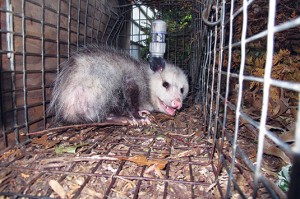Are Virginia opossums causing problems for you and your clients? The following facts and figures may help you better manage Didelphis virginianus.
⦁ Virginia opossums are the only opossum species in North America and the only marsupial on the continent. Males weigh an average of 6 lbs.; females average 4 lbs., but they can weigh as much as 15 lbs.
⦁ They are able to climb, but usually invade crawlspaces at the ground level.
⦁ Opossums rarely contract rabies. Some have theorized that their low body temperature (95.9°F) may slow the virus’ development.
⦁ They’re not well adapted to northern climates. They frequently suffer frostbite injuries to their ears, toes and tail.
⦁ Research shows that opossums remain in their den when temperatures fall below 21°F. Between 21°F and 28°F, they’ll forage for about 90 minutes. Above 28°F, they might forage for as long as nine hours.
⦁ Opossums are loners, except when females are raising young. A mother will carry her babies in her pouch or on her back.
⦁ They’re omnivores, eating carrion, insects, fruits and grains.
⦁ Opossums don’t seem to become trap wise; they readily enter cage traps (7x7x24 in. or larger) with sweet or meat-based baits.
⦁ When threatened, opossums flee. When running isn’t an option, they’ll freeze, bare their teeth and hiss. Sometimes, they play dead — thus the term “playing possum.” If clients complain of an opossum that won’t move, tell them to leave it alone (including children and pets), because it will leave when it feels the coast is clear. Any undisturbed opossum still lying there after eight hours, however, is likely ill or injured and will need to be removed.
⦁ Frequently, nontarget opossums will refuse to leave the cage trap when the door is opened. Use a pair of cat graspers to easily and gently remove the opossum from the cage.
⦁ Opossums have glands near the anus that can emit (not spray) a greenish musk that can sometimes smell like skunk essence.
⦁ They are the definitive carrier of Sarcocystis neurona, a parasite that causes equine protozoal myeloencephalitis (EPM). Horses afflicted with EPM lose muscle coordination. Opossums shed the protozoa in their feces, which can contaminate horse feed.
⦁ Opossums host several ectoparasites, including the cat flea (Ctenocephalides felis), the American dog tick (Dermacentor variabilis), and the Lone Star tick (Amblyomma americanum). They also help maintain the fleas that carry murine typhus, which afflicts coastal areas in California and Texas.
Dr. Stephen Vantassel runs Wildlife Control Consultant LLC, a company that educates the public about wildlife damage issues. Contact him at stephenvantassel@hotmail.com.

Leave A Comment